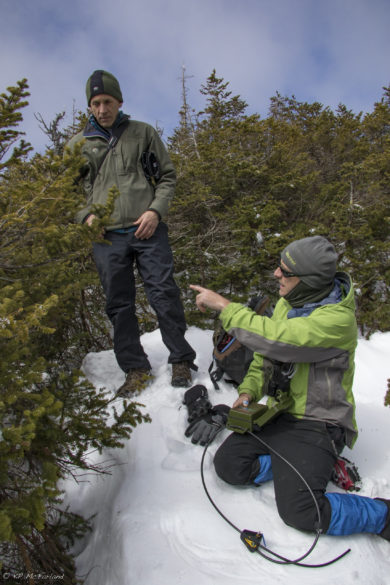
John Lloyd and Chris Rimmer installing autonomous recording devices to monitor birds on Mt. Mansfield. Photo by K.P. McFarland
Dr. John Lloyd, VCE’s director of science, and 58 others were named Elective Members of the American Ornithological Society (AOS) at the opening of their annual conference earlier this month. Elective Members are selected by their peers for their significant contributions to ornithology or service to the society. In keeping with the AOS’ geographic focus, Elective Members are residents or citizens of the Western Hemisphere, and represent the interests of the global ornithology community.
Lloyd becomes the third scientist at VCE to be named an Elective Member of the AOS: Kent McFarland was named an Elective Member in 2007 and Chris Rimmer has been an Elective Member since 2002 and a Fellow of the AOS since 2012. New Elective Members are nominated each year by current Elective Members, Fellows, or by AOS’ nominations committee, and are confirmed through a vote of the current Elective Members and Fellows.
“Being named an Elective Member of the AOS means that ornithological leaders have chosen to formally recognize their accomplishments and contributions to the scientific community. Joining the ranks of Elective Members is an important event in our professional society,” says Steve Beissinger, president of the AOS. “For over a century, the Society has made a point of celebrating excellence among our colleagues working to advance our understanding of birds and contributing to our scientific knowledge in order to conserve them.”
Lloyd began his career as an ornithologist at the University of Vermont, where he earned a bachelor’s of science in Wildlife Biology. After a brief stint studying Roseate Terns on Long Island Sound, he headed west. The first stop was the University of Arizona, where John received a master’s of science for his research on the effects of fire suppression on birds in the desert grasslands of southern Arizona. He then spent a year working on a research fellowship in Rocky Mountain National Park, studying the ecological relationships between elk, aspen, and songbirds, before moving to the University of Montana to pursue a doctorate. John’s doctoral research focused on the ecology, evolutionary biology, and conservation of grassland birds in eastern Montana and western North Dakota, with a special focus on Chestnut-collared Longspurs.
After completing his doctorate, Lloyd returned to Vermont, and in recent years he has focused his research on the ecology and conservation of birds of south Florida, the Caribbean, and the mountains of the northeastern US.
